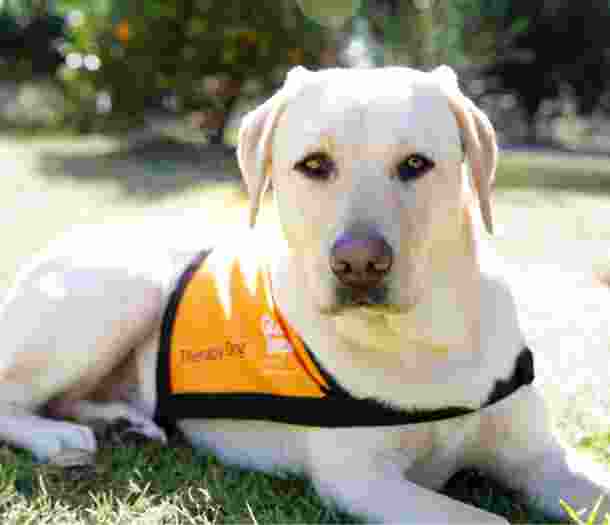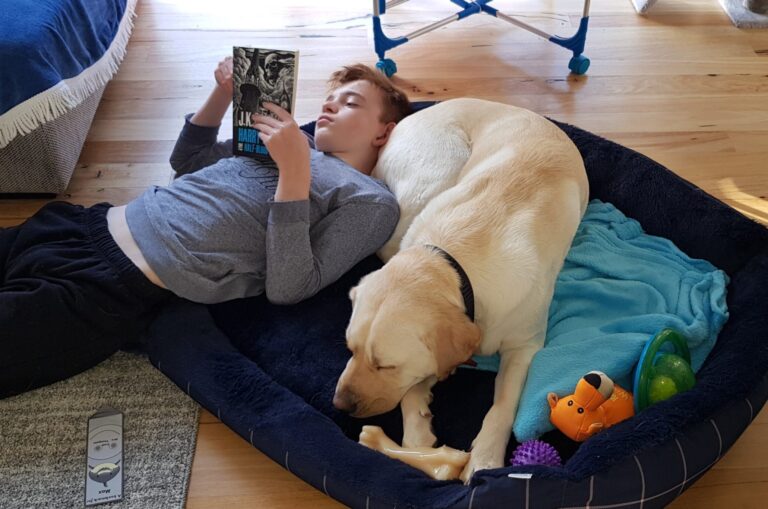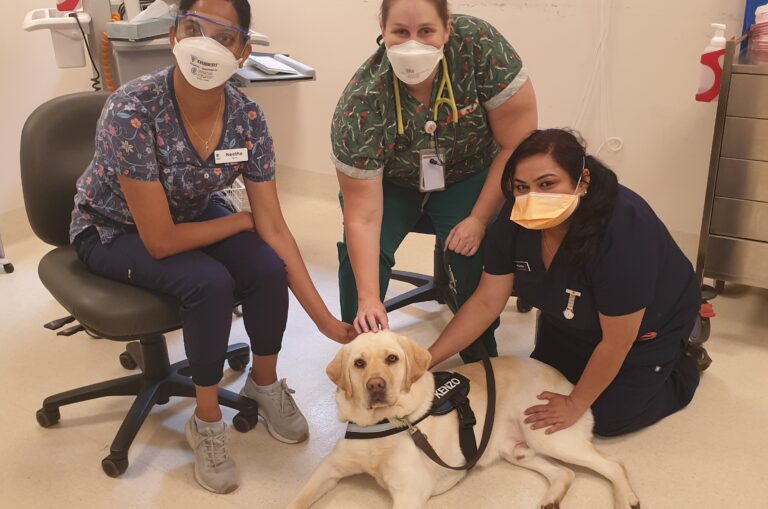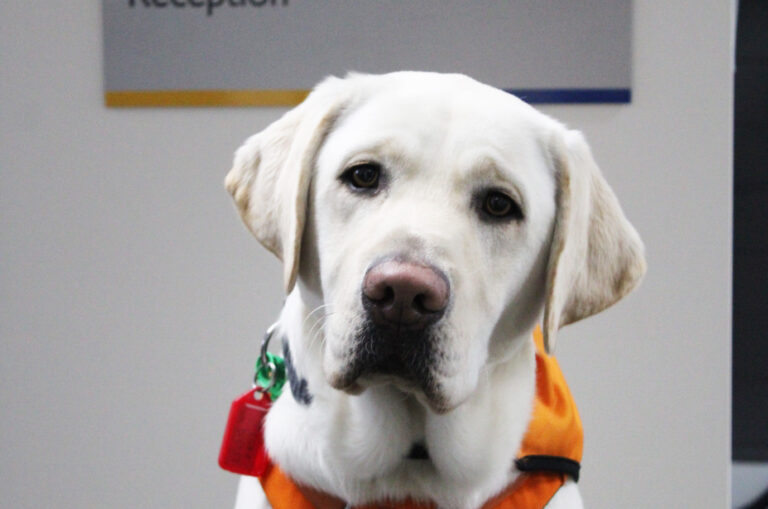On this page:
About the Therapy Dog Program
A Therapy Dog provides comfort, companionship and emotional support.
Therapy Dogs can particularly support people who experience behavioural, emotional, developmental and mental health conditions, physical disabilities or isolation caused by age or illness.
We currently offer two Therapy Dog Programs:
Therapy Dogs for Individuals
The primary role of a Therapy dog for an individual is to provide companionship and emotional support to individuals who might benefit.
Therapy Dogs for Facilities
The primary role of a Therapy dog for a facility is to provide companionship and emotional support on a broader scale to appropriate facilities, such as schools, nursing homes, psychologists, counsellors, and rehabilitation clinics.
Please note that Guide Dogs Victoria does not offer training for pet dogs to become Therapy Dogs, and are not able to assist in registering your pet dog as a support animal.
Therapy Dogs are not Assistance Dogs and therefore do not have Public Access Rights like a Guide Dog does.

Am I eligible for a Therapy Dog?
To apply for a Therapy Dog you need to meet the following criteria:
- Reside in Victoria, Australia
- Be capable of exercising a large breed dog for a minimum of 1 hour each day outside of the home
- Our Therapy dogs are raised to be around people inside the home and are not conditioned to be left alone for long periods of time throughout the day.
- Ensure your backyard and fencing is dog proof.
- Committed to health checking and grooming the dog daily.
- Be able to afford the ongoing costs of dog ownership.
- Willing to commit to caring emotionally, physically and financially for a dog for 10+ years.
A full list of criteria is provided in the Self-Assessment which you will receive upon application.
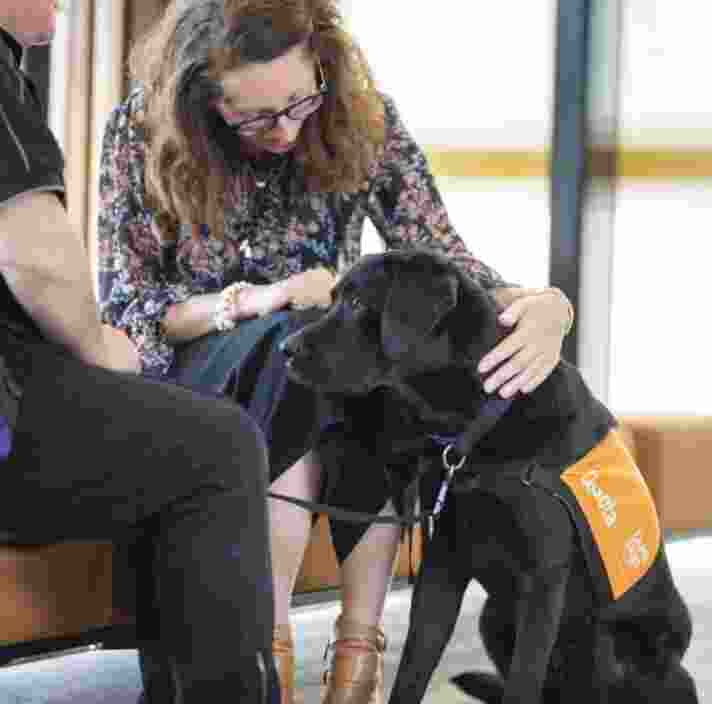
Find out more
Applications now open (limited availability)
Therapy Dog Stories
Learn more about Therapy Dogs working in the community
Frequently Asked Questions
Therapy Dog FAQs
Dogs used in the Therapy Dog Program are Labrador Retrievers, and Labrador/Golden Retriever mix. We do not offer small breed dogs.
Dogs in the Therapy Dog Program are typically placed with clients when they are 14-18 months of age.
Unfortunately, no. If you experience allergic reactions to dog hair, please be aware that Labradors and Labrador/Golden Retriever mixes shed a lot of hair, and this may irritate people with allergies to dog hair.
Therapy dogs may assist those with behavioural and mental health conditions, physical disabilities and illness by reducing anxiety, increasing a sense of community, encouraging routine and commitment, and of course, providing unwavering friendship.
Our Therapy dogs are Labradors from our own breeding program that are trained in basic obedience, have great home manners, are reliable on lead, and are exposed to mobility equipment where necessary.
Therapy Dogs are placed with Clients in the capacity of a companion animal, not an assistance animal. Therefore, they do not have public access rights.
Although Therapy Dogs are matched to Clients based on carefully considered criteria, they are not trained in behaviours to specifically assist with alleviating health concerns and so cannot be considered an Assistance Animal. Please see www.assistancedogsinternational.org for more information regarding assistance dog standards and types.
Should you wish to take your Therapy Dog into public places—like medical appointments, school grounds, cafés, or other similar places—you will need to seek permission from each individual establishment which may or may not grant access.
Some dogs provide security, assistance and friendship to those with PTSD as a result of their time in service.
Integra Service Dogs Australia work with Veterans and First Responders living with Post-Traumatic Stress Disorder (PTSD) and their families by enriching lives through highly-trained canine guardians.
A not-for-profit organisation, Integra supports Veterans and First Responders through the provision of dogs that provide security, assistance and friendship to those with PTSD as a result of their time in service.
Once a dog is identified as showing potential for this work by GDV staff, Integra Service Dogs Australia carry out a more specific assessment of the dogs’ potential before providing additional training in readiness for matching with one of their own clients.
Contact Integra Service Dogs Australia via their website here for more information.
Meet Kenzo, who has a special role as the "Director of Happiness" at a hospital in Victoria.
Ready to continue?
Seems like you have filled this form earlier. Let’s pick up where you left off.
